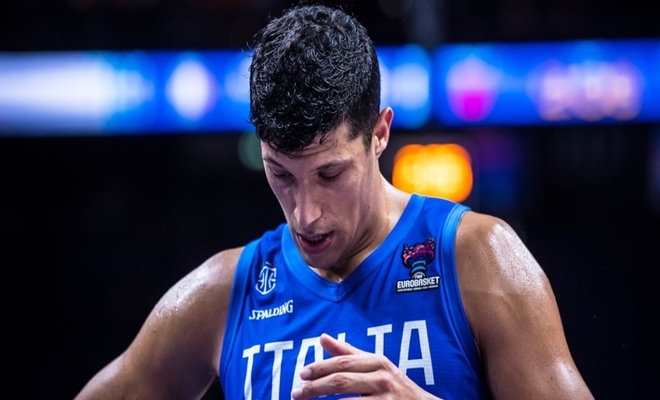-
 August 31, 2025, 6:38 pm
August 31, 2025, 6:38 pmLast Updated on September 3, 2025 7:45 am by André Lemos | Published: August 31, 2025
Greece 94, Georgia 53
Giannis leads another ruthless Greek performance. Greece came out intent on pushing the pace, and Georgia struggled to generate clean looks against their length and physicality. Early on, Dinos Mitoglou stretched the floor with two quick pick-and-pop threes, while Giannis Antetokounmpo was involved in every action on both ends. Georgia’s offense repeatedly found itself deep into the shot clock, relying only on the occasional late mismatch attack to stay in touch.
A brief attempt at a 2-2-1 press to start the second quarter fizzled and Greece capitalized. Their defense turned stops into a transition masterclass, building a 46-29 halftime cushion. By then, Georgia were already showing cracks in focus, committing sloppy errors that Greece punished.
The third quarter was more of the same: Greece shared the ball, punished the double-teams Giannis attracted and kept Georgia out of rhythm. Even when Georgia went small and switched everything, finding some success by allowing only 5 points in the final 4 minutes, they still couldn’t score consistently on the other end. Greece won the quarter 23-12 and never looked back.
Giannis was dominant with 27 points, 8 rebounds, and 4 assists in 25 minutes, supported by Mitoglou’s 17 points. Greece finished with 28 assists, hit 14-of-26 threes (56%), and racked up a 19-0 edge in fast-break points. Georgia’s only positive came on the offensive glass (15 boards, 12 second-chance points), but they shot just 30% from the field and 18% from three. Mamukelashvili, Sanadze, and Shermadini reached double figures, while Goga Bitadze did not play and Toko Shengelia logged only a brief cameo.
The 94-53 win moved Greece to 3-0 in Group C, their defense and tempo once again overwhelming an opponent that quickly ran out of answers.
Slovenia 86, Belgium 69
Belgium opened with a clear defensive plan to contain Luka Dončić, using Jean-Marc Mwema on him early and switching with Ismaël Bako at times. Dončić missed his first four shots, and 2 quick fouls in the first quarter on Jean-Marc Mwema opened things up for Slovenia, with Edo Murić providing an early lift. Offensively, Belgium looked to pound the ball inside against Slovenia’s switching, but Slovenia’s guards and Dončić himself held up physically, keeping those post-up chances from turning into an advantage.
Trailing by double digits midway through the second quarter, Belgium started blitzing Dončić at the top of the floor. It worked briefly, but as Slovenia swung the ball, open threes began to drop. When Belgium abandoned that approach, Dončić went back to hunting mismatches against the smaller Lecomte. Unlike earlier games, Slovenia’s offense showed more balance, with multiple contributors easing the burden on Dončić. Defensively, they were sharp: Belgium had just 10 points in the first quarter, shot 1-of-7 from three in the half, and struggled to score in the paint against Slovenia’s compact help. Slovenia led 44-26 at halftime.
Slovenia opened the second half with a 7-0 run to stretch the lead to 19, but careless turnovers allowed Belgium to claw back within 11. Belgium caught fire from deep, hitting five threes in the third quarter while producing just two points in the paint. Slovenia mixed in a 2-3 zone on baseline inbounds, but their rotations were shaky. Still, Belgium’s short bench showed as their energy faded in the fourth.
That’s when Klemen Prepelič stepped up, scoring 6 of his 12 points in the final quarter to put the game away. Dončić closed with a historic triple-double, 26 points, 11 assists, 10 rebounds, becoming only the fourth player since 1995 to record one at EuroBasket. Slovenia dominated the glass 43-31, outscored Belgium 40-18 in the paint, and sealed their first Group D win at 86-69.
Belgium, now 1-2, had Bako battling inside but struggled to sustain their perimeter momentum. Slovenia, meanwhile, looked more fluid and collective than in previous outings, with Dončić making history in the process.
Israel 82, France 69
France looked disjointed to open the game, managing only six points in the first five minutes. The entry of Zaccharie Risacher (back-to-back threes, then 10 quick points) and Jaylen Hoard’s activity shifted momentum, with their length and pace difficult for Israel’s bench to match. Still, foul trouble in the first quarter with Deni Avdija drawing 3 fouls in under 2 minutes and Israel’s zone defenses kept Les Bleus out of rhythm. France shot just 14% from the field for most of the second quarter and went 3-of-13 from deep by halftime, while Israel stayed close through free throws and timely three-pointers. The game was tied 26–26 midway through the second before France regained a slim edge.
In the third, Deni Avdija and Yam Madar sparked Israel with consecutive threes and strong defense, helping their side take a 42–38 lead. Hoard (6-of-6 from the field at one stage) and Okobo’s back-to-back threes, including a four-point play, briefly carried France ahead by one entering the fourth.
But France unraveled in the final frame. Two early turnovers fueled Israel’s transition game, and Avdija pushed the pace, drawing fouls and piling on pressure. Israel strung together an 11-0 run, holding France scoreless for nearly three minutes, and seized control at 66–59. From there, France’s offense, bogged down against Israel’s 2-3 zone and overreliant on athletic plays, produced just 13 points in the quarter, their lowest of the tournament.
Avdija finished with 23 points, 8 rebounds, and 5 steals in a commanding all-around display. Madar added 17 points, while Roman Sorkin’s inside presence and Israel’s stretch bigs opened the floor for guards to create. Israel shot 7-of-18 from three and limited France to 8-of-32, suffocating them with disciplined zone rotations despite some backdoor lapses.
France did tally 19 assists and 9 blocks, but their inconsistency and inability to solve Israel’s defensive looks proved costly. With the win, Israel moved to 2–1 in Group D, tied with France, and solidified their reputation as one of the tournament’s dark horses.
Spain 91, Cyprus 47
Spain were in control from the outset and had no trouble dispatching hosts Cyprus, 91-47. The defending champions imposed their size and ball movement throughout, winning the rebounding battle 46-24 and piling up 29 assists against just 11 for Cyprus. The hosts never found rhythm, finishing 0-of-2 from the free-throw line and committing 18 turnovers. Darral Willis was the lone bright spot, contributing 16 points and 6 rebounds.
Willy Hernangómez set the tone inside, leading Spain with 19 points on near-perfect shooting plus 8 rebounds and 3 assists. His production anchored an offense that shared the ball and spread the floor with 14 made three-pointers. By halftime Spain had built a 41-17 lead, and from there the gap only widened.
We saw Coach Scariolo use this game to test Juancho Hernangómez at the small forward position, a different look we haven’t seen so far in this tournament. It could become a weapon to exploit later and even though its effectiveness was hard to assess in this type of game, it’s something to keep an eye on.
Head coach Sergio Scariolo praised his team’s approach on the second night of a back-to-back, highlighting the unselfishness and composure that defined the performance. Spain improved to 2-1 in Group C, with a much tougher test against Italy ahead, while Cyprus remain winless at 0-3.
Poland 84, Iceland 75
Poland opened the game by pushing the pace and relying on Mateusz Ponitka as the floor general, setting a strong rhythm early. Iceland struggled to find cohesion offensively, turning the ball over frequently, while Poland’s own aggressiveness in transition also led to some early miscues. Tryggvi Hlinason posed a serious threat in the paint, forcing Poland to crowd the lane and adjust their interior defense. Jordan Loyd complemented the team effort with efficient cuts and smart reads off screens.
By halftime, Poland had accumulated 13 assists and controlled the flow, despite Iceland’s continued struggles from deep (3-of-17 from three). Poland extended their lead through a dominant third quarter, relying on transition scoring and careful ball movement. Iceland refused to go away, however, mounting a late fourth-quarter comeback that briefly gave them the lead with about three minutes remaining.
Poland responded immediately, taking advantage of a string of Icelandic fouls, including an unsportsmanlike and a technical, that shifted momentum decisively. Dominik Olejniczak’s mid-range hook and Loyd’s free throws in the final seconds sealed an 84-75 victory.
Ponitka finished with a near triple-double line of 18 points, 8 rebounds, and 8 assists, underlining his role as Poland’s engine, while Poland out-rebounded Iceland 41-31 and matched them point-for-point in the paint despite Hlinason’s dominance. Fast-break execution also proved crucial, with Poland outscoring Iceland 18-11 in transition. The win secured Poland’s ticket to the Round of 16, keeping them unbeaten at 3-0 in Group D.
Italy 96, Bosnia & Herzegovina 79
Bosnia & Herzegovina came out with energy, quickly building an early six-point lead. Italy responded, staying patient and methodical, and headed into halftime with a narrow 44-40 advantage. Both teams showed offensive creativity, but Italy’s superior ball movement and spacing kept them in control despite Bosnia’s early aggressiveness.
The second half began similarly, with Bosnia briefly reclaiming the lead. Italy, however, adjusted efficiently, relying on the hot hand of Simone Fontecchio, who ended the night with 39 points, 8 rebounds, and 3 assists, including 7-of-10 shooting from deep. The Azzurri maintained their advantage with a 28-21 third quarter and a 24-18 fourth quarter, combining sharpshooting with disciplined ball movement that produced 25 assists on the night.
Jusuf Nurkic starred for Bosnia with 21 points and 10 rebounds, while Edin Atic added 10 points, 5 rebounds, 8 assists, and 4 steals. Italy’s overall offensive efficiency was remarkable, connecting on 58.3% from three and limiting Bosnia to just 5-of-21 from deep. The team also dominated the boards, finishing with a 46-24 advantage, which allowed them to generate multiple second-chance opportunities and control the tempo.
Tactically, Italy’s combination of spacing, off-ball movement, and high-volume three-point shooting forced Bosnia into difficult defensive rotations, especially when Fontecchio was operating off screens. Italy also showed patience against Bosnia’s defensive pressure, moving the ball and exploiting mismatches, while staying disciplined even after the ejection of coach Gianmarco Pozzecco early in the second half.
Darius Thompson and Marco Spissu contributed 14 points each, combining for 9 assists, supporting Italy’s offensive balance. Italy’s victory improved their record to 2-1 in Group C and set up a important matchup against Spain, while Bosnia falls to 1-2 and will face undefeated Greece next.
Simone Fontecchio made history for Italy at FIBA EuroBasket 2025 by setting a new single-game scoring record with 39 points against Bosnia and Herzegovina. The 29-year-old forward, who struggled in Italy’s opening games, was unstoppable, hitting 13 of 20 shots, including 7 of 10 from three-point range, and also adding 8 rebounds and 3 assists. His performance surpassed Andrea Bargnani’s previous record of 36 points from EuroBasket 2011.
This article was written by the European Hoops team: Tiago Cordeiro, João Caeiro, Diogo Valente and André Lemos. Make sure you give us a follow on Twitter at @EthosEuroleague!
